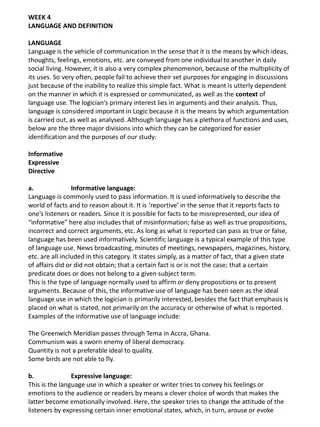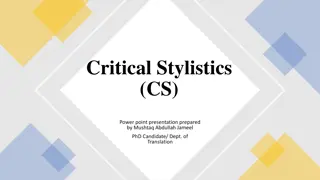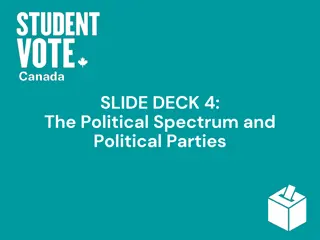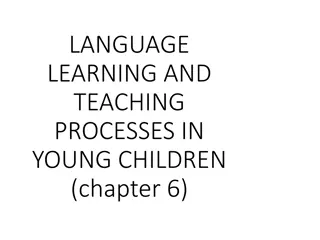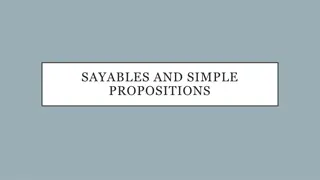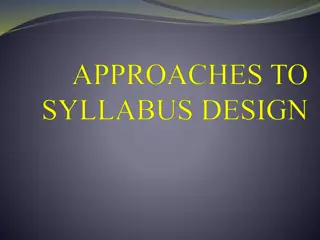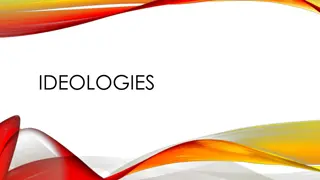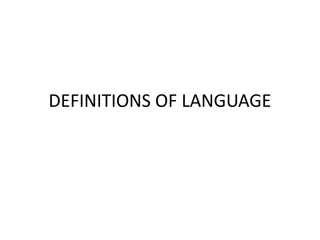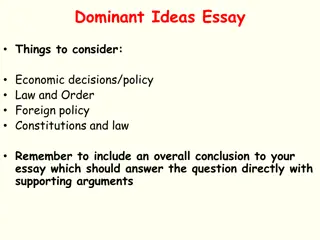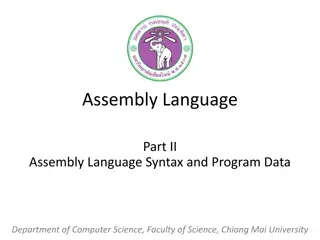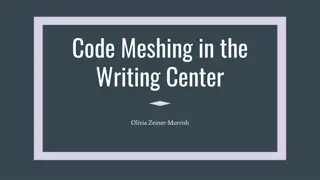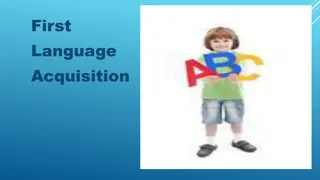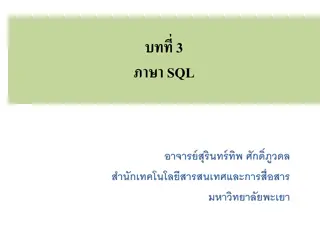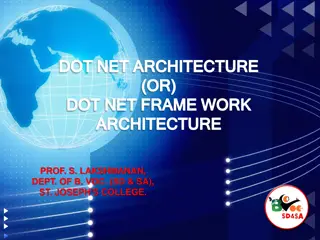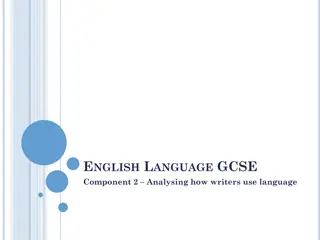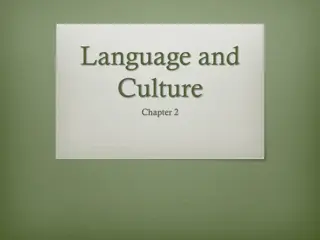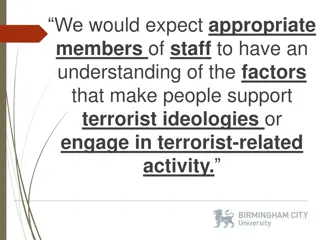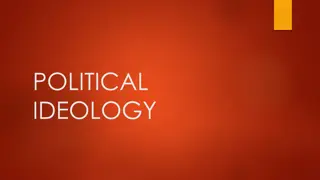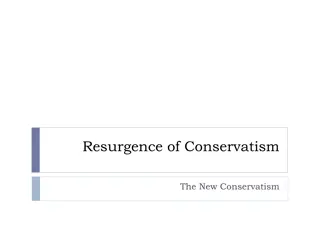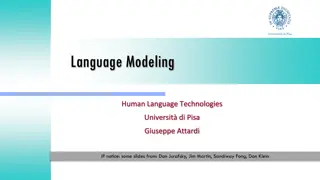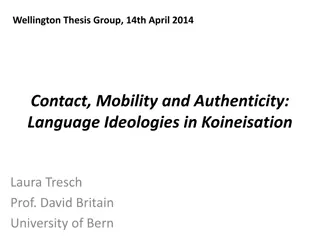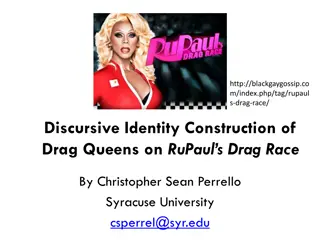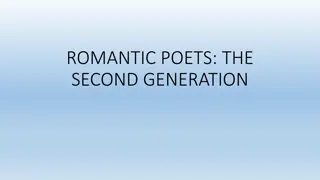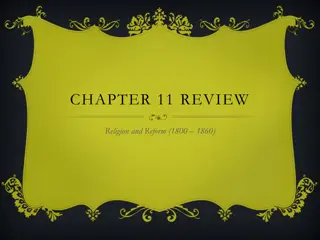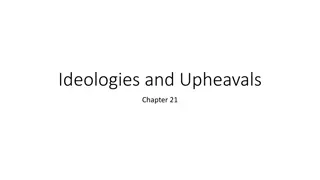Career Opportunities and Challenges in Translation & Interpreting Pedagogy Post-Pandemic
The APTIS 2022 conference explores new avenues in Translation and Interpreting (T&I) pedagogy amidst a changing landscape. Dr. Bego A. Rodriguez highlights emerging roles for T&I graduates. The context reveals a decline in language learning in the UK, impacting the Language Service Industry. The UK'
0 views • 13 slides
Understanding Sovereign Citizens: Beliefs and Practices
Sovereign citizens hold unconventional beliefs about government and law, leading to practices like rejecting licenses and using unique legal language. David Wynn Miller, a prominent figure in this movement, has influenced their ideologies. This group's actions can create challenges and legal conflic
3 views • 10 slides
Language Study Community – Enhance Your Language Skills
Joining a Language Study Group is a fantastic way to take your language learning to the next level. By leveraging the power of Group Study, you can immerse yourself in the language, enhance your understanding, and build confidence in your speaking abilities. Read full article \/\/explainlearning.com
1 views • 3 slides
Academic Language Demands and Supports in Instructional Planning
Academic Language Demands and Supports are crucial in educational settings to ensure comprehension and usage of language by students. This content discusses embedding language demands in lesson plans, providing language supports, and peer review activities to enhance academic language skills. The fo
6 views • 10 slides
The Significance of Media in Language Learning
Media plays a crucial role in language learning by raising awareness of the ideology behind linguistic structures and providing valuable information on society and culture. Linguists are drawn to media language for research purposes and to understand its impact on language use and attitudes. Media s
12 views • 5 slides
Understanding Translation: Key Concepts and Definitions
Translation involves transferring written text from one language to another, while interpreting deals with oral communication. Etymologically, the term "translation" comes from Latin meaning "to carry over." It is a process of replacing an original text with another in a different language. Translat
11 views • 76 slides
Language and Communication in Society: Understanding Interactions
Explore the intricate relationship between language and society through lectures focusing on language in interaction, power dynamics, language contact and change, public space discourse, linguistic landscaping, and more. Delve into the shift from structural linguistics to societal communication, red
6 views • 28 slides
Understanding Language: Informative, Expressive, and Directive Uses
Language serves as a vital medium for communication, allowing the conveyance of ideas, thoughts, and emotions. It is a complex phenomenon with diverse uses. This text delves into the three major divisions of language use - informative, expressive, and directive. Informative language conveys facts, w
4 views • 6 slides
Understanding Critical Stylistics: Tools and Application
Critical Stylistics (CS) is a method that delves into the ideological underpinnings of texts through the analysis of linguistic features. Developed by Jeffries, CS focuses on uncovering implicit ideologies embedded in texts by examining stylistic choices. By integrating stylistics and critical disco
2 views • 28 slides
Understanding the Political Spectrum and Ideologies
Explore the political spectrum, ideologies, and the role of government in society. Learn about the differences between the left and right, economic vs social issues, and the debate surrounding traditions and societal change. Dive into discussions on government services, taxes, traditions, and societ
0 views • 15 slides
Language Learning and Teaching Processes in Young Children
Development of language in young children is influenced by various factors such as their cultural and linguistic environment, unique characteristics, and interactions with adults. Optimal language development requires language stimulation from the environment. Varied cultural practices impact langua
1 views • 51 slides
Revolutionaries Throughout History: From Lenin to George Washington
Explore the lives and ideologies of influential revolutionaries such as Lenin, Che Guevara, Nelson Mandela, Gandhi, and George Washington. Dive into their causes, ideologies, use of violence, and desire for change, drawing parallels between them and assessing their impact on history.
0 views • 16 slides
Understanding Language in Stoicism: Significance and Corporeality
Language in Stoicism plays a crucial role in the process of assenting to impressions by focusing on corporeality, reason, and truth. It distinguishes between the mundane vocal sounds, articulated speech, and significant language to convey meanings effectively. The significance of language lies not i
2 views • 13 slides
Understanding Language Teaching Syllabus: Integration, Theory, and Approaches
Language Teaching Syllabus involves the integration of subject matter and linguistic elements, guided by theories of language and learning. Various approaches like Grammatical, Situational, Communicative, and Analytic are used to structure syllabi. Breaking language into parts aids in sequential lea
1 views • 28 slides
Overview of Political Ideologies
Explore various political ideologies ranging from individualism to communism, each with distinct beliefs on government intervention, economic policies, and social structures. From libertarianism to fascism, understand the core principles and characteristics that define these ideologies.
0 views • 8 slides
Exploring Language and Communication Through a Short Film
In this lesson, students will watch a 10-minute short film titled "The Most Beautiful Thing" by Cameron Covell. They will reflect on the value of learning another language, analyze how facial expressions and body language convey emotions, and develop empathy towards those facing language barriers or
0 views • 29 slides
Various Definitions of Language Throughout Linguistic History
Different linguists and scholars have offered various definitions of language over time. Sapir (1921) emphasized language as a method of communicating ideas, emotions, and desires through voluntary symbols. Bloch and Trager (1942) focused on the social aspect of language as a system of vocal symbols
1 views • 12 slides
Impact of Dominant Ideas on Electoral Performance: A Comparative Analysis of Thatcherism and New Labour's Third Way
Examining the influence of dominant ideas on electoral success, this essay delves into the contrasting ideologies of Thatcherism and New Labour's Third Way within British politics. By scrutinizing their economic decisions, foreign policies, and overall governance, the essay analyzes how these ideolo
0 views • 8 slides
Introduction to Assembly Language Syntax and Program Data
Learn about the syntax of assembly language and how data, variables, and constants are used in programming. Explore the basic instructions and the translation of high-level language into assembly language. Discover the role of an assembler in translating assembly language programs into machine langu
4 views • 36 slides
Enhancing Language Learning Across the Curriculum in B.Ed. 1st Year Course
Language Across the Curriculum (LAC) emphasizes that language learning should occur across all subjects, not just in language classrooms. It highlights the importance of incorporating language development into every learning activity, fostering multilingualism in schools. Language plays a crucial ro
2 views • 34 slides
Understanding Language Ideologies in Writing Education
Exploring the debate on whether writers should use their own English or conform to standard language rules, this content delves into the perspectives of Stanley Fish and Vershawn Ashanti Young. Fish argues for teaching standard English to avoid prejudice, while Young critiques this view, advocating
1 views • 17 slides
Understanding First Language Acquisition Process
First language acquisition is the process through which humans develop the capacity to perceive, comprehend, and effectively use language to communicate. It primarily focuses on infants acquiring their native language. Basic requirements, caregiver speech features, and the acquisition schedule play
0 views • 19 slides
Comprehensive Overview of SQL Commands and Language Categories
In this detailed guide, you will learn about Structured Query Language (SQL) including its various commands such as Data Definition Language (DDL), Data Manipulation Language (DML), Data Control Language (DCL), and Transaction Control Language (TCL). Explore how SQL is used in Database Management Sy
0 views • 15 slides
Speech and Language Developmental Milestones: A Bilingual/Multilingual Perspective
Speech and language developmental milestones are crucial for children, regardless of their home language. These milestones encompass receptive language, expressive language, pragmatics, and articulation and phonology. Understanding how a child hears and talks from birth to one year is essential, as
1 views • 23 slides
Understanding .NET Framework Architecture and Common Language Runtime
This content delves into the intricacies of .NET architecture, highlighting its structure, common language runtime, and key components such as Common Type System (CTS) and Common Language System (CLS). It explains how .NET supports multiple languages, facilitates cross-language interoperability, and
0 views • 13 slides
Analyzing Writer's Language Use in English Language GCSE Component 2
In English Language GCSE Component 2, students learn to analyze how writers use language. The learning objective focuses on commenting, explaining, and analyzing language use with relevant subject terminology. The exam assesses students on their ability to interpret and explain a writer's thoughts,
0 views • 12 slides
Language and Culture Reflections: Diversity in Linguistic Emphasis
Exploring the correlation between language and culture, this content delves into how various languages reflect cultural values and priorities. Through examples like the Inuit language with rich vocabulary for snow and seals, the Shinzwani culture's unique word for mother and aunt, and the evolving l
0 views • 50 slides
Understanding Factors Influencing Support for Terrorist Ideologies
Staff members should possess knowledge on factors driving people towards terrorist ideologies. The Prevent Strategy aims to combat extremism and prevent individuals from engaging in terrorist activities through promoting partnerships and upholding British values. However, challenges such as lack of
0 views • 43 slides
Understanding Political Ideologies: Liberalism and Conservatism Explained
Political ideologies shape beliefs about the role of government and societal balance between the public and private sectors. Liberalism focuses on individual liberty and government intervention for equality, while conservatism emphasizes limited government, traditional values, and free markets. Psyc
0 views • 25 slides
The Resurgence of Conservatism in America
The resurgence of conservatism in America has brought about a clear distinction between conservative and liberal ideologies. Conservatives emphasize limited government intervention, promoting free-market principles, individual liberty, and moral values. On the other hand, liberals advocate for gover
0 views • 14 slides
Understanding Language Modeling in Human Language Technologies
Exploring the concepts of language modeling in human language technologies, this presentation delves into N-grams, the chain rule of probability, evaluation metrics like perplexity, smoothing techniques such as Laplace, and the goal of assigning probabilities to sentences. It covers applications lik
1 views • 81 slides
Language Ideologies in Dialect Contact Situations
The study explores how language ideologies influence the legitimacy and status of different dialect varieties in contact situations. It delves into the construction of power relations, social sameness and difference, and cultural stereotypes through language use. Key concepts such as language ideolo
0 views • 28 slides
Introduction to Language Technologies at Jožef Stefan International Postgraduate School
This module on Knowledge Technologies at Jožef Stefan International Postgraduate School explores various aspects of Language Technologies, including Computational Linguistics, Natural Language Processing, and Human Language Technologies. The course covers computer processing of natural language, ap
0 views • 27 slides
Linguistic Analysis of Drag Queen Identities on RuPaul's Drag Race
This analysis explores how drag queens construct their identities through language on the reality television show RuPaul's Drag Race. The study delves into linguistic patterns, cultural ideologies, and social meanings utilized by drag queens, highlighting the multi-layered and polyphonous nature of
0 views • 17 slides
Exploring Sociolinguistics: Language Variation and Social Factors
Sociolinguistics delves into the study of language variation influenced by social factors, examining the relationship between language and its social context. It explores various aspects like standard pronunciation, language choice, speech acts, language components, language variety, and factors suc
0 views • 73 slides
Understanding Assembly Language Programming for Computing Layers
Assembly language is a low-level programming language that enables direct interaction with a computer's hardware components. This content explores the fundamentals of assembly language, the relationship between human-readable machine language and binary code, an assembly language program for multipl
0 views • 31 slides
Understanding Language Anxiety in Foreign Language Learning and Teaching
Explore the impact of language anxiety on students and teachers in foreign language learning and teaching contexts through insights from Dr. Christina Gkonou's research. Delve into the theoretical background, implications for language education, and real-life experiences shared at the Essex Language
0 views • 25 slides
The Second Generation of Romantic Poets: A Revolution in Poetry and Ideals
The second generation of Romantic poets, including Keats, Byron, and Shelley, rebelled against societal norms, championing freedom, individuality, and social change. Their poetry reflects a struggle with language's limitations in expressing profound emotions and ideas. Percy Bysshe Shelley emerges a
0 views • 10 slides
Religion and Reform: 19th Century Ideologies and Movements
Explore the influence of individualism through transcendentalism, rural communalism, and urban popular culture in the 1800s. Delve into the ideologies of Ralph Waldo Emerson, Henry David Thoreau, Margaret Fuller, and Walt Whitman. Learn about utopian societies, the Mormon experience, and nativist mo
0 views • 15 slides
Ideologies and Upheavals: Congress of Vienna and Impact
The Congress of Vienna, a gathering of key European powers, aimed to establish lasting peace after Napoleon's defeat. Key agreements included territorial compensation, restoration of monarchs, and the formation of the Holy Alliance. While successful in preventing major wars, the Congress lacked fore
0 views • 19 slides







